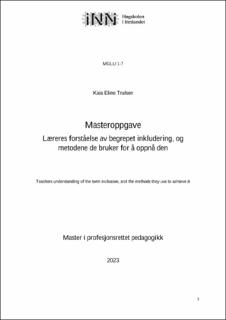| dc.contributor.advisor | | |
| dc.contributor.author | Trulsen, Kaia Eline | |
| dc.date.accessioned | 2023-07-12T16:10:15Z | |
| dc.date.available | 2023-07-12T16:10:15Z | |
| dc.date.issued | 2023 | |
| dc.identifier | no.inn:inspera:136491409:37704352 | |
| dc.identifier.uri | https://hdl.handle.net/11250/3078306 | |
| dc.description.abstract | Temaet for dette forskningsprosjektet er læreres forståelse av begrepet inkludering, og metodene de bruker for å oppnå den. Det er blitt undersøkt ulike sider ved inkludering slik som hvordan det arbeides med inkludering i skolen, forskjellen på sosial og faglig inkludering og hva som er viktig for å skape god inkludering i skolen. Det er også blitt sett på hvilke konsekvenser det kan ha om inkludering ikke er til stede for elever i skolen.
I denne oppgaven er det benyttet en kvalitativ forskningsmetode, hvor det er semi-strukturert intervju som er benyttet for å samle inn data. Her ble tre lærere på mellomtrinnet brukt som informanter, hvor alle jobber på forskjellige skoler og hvor erfaring i jobben som lærer varierer. For å forstå og sammenligne dataen som kom frem i intervjuene er det benyttet en tematisk analyse for å besvare problemstillingen: Hvordan forstår lærere begrepet inkludering, og hvilke metoder brukes for å inkludere alle elever i skolen?
Resultatene viser at det er en felles forståelse av begrepet inkludering mellom informantene, men også mellom teoretikere og litteratur. Derimot ser man at inkludering ikke har en klar og enstemmig definisjon, den må heller bli sett på som en prosess og en reise, ikke en destinasjon og et avsluttende mål. Det alle derimot er enige om er at inkludering er til stede om en elev føler tilhørighet til en gruppe, noe som også er et av behovene i Maslows behovshierarki. Den sosiokulturelle læringsteorien viser til at mennesker har en proksimal utviklingssone, hvor man trenger hjelp for å nå målene.
I denne oppgaven er det funnet ut at inkludering er viktig for å kunne klare seg bedre faglig i skolen, hvor alle informantene påpeker at man må begynne med inkluderingen før man kan begynne med det faglige på grunnlag av dette. Videre er det få spesifikke metoder for inkludering som har kommet frem i oppgaven, derimot er det kommet frem mye viktig informasjon om hvordan man kan få til god inkludering i skolen. Det vil si at det i oppgaven blir mer fokusert på de faktorene det er viktig å ta til betraktning for god inkludering enn selve metodene som blir brukt. Eksempelvis har foreldreinvolvering, relasjoner og lærersamarbeid blitt til overordnede temaer som er viktig å fokusere på for å få til god inkludering. Relasjoner er en faktor som må være til for å kunne skape god inkludering, dette fordi dårlige relasjoner vil kunne ekskludere eleven enda mer og det vil kunne skade elevens psykiske helse. | |
| dc.description.abstract | The topic of this research project focuses on teachers' understanding of the concept of inclusion and the methods they use to achieve it. Various aspects of inclusion have been examined, such as how inclusion is worked on in schools, the difference between social and academic inclusion, and what is important to do to create successful inclusion in schools. In addition, the research project also examines the consequences of unsuccessful inclusion if not properly presented to pupils in the school.
In this thesis, a qualitative research method is used in which semi-structured interviews are used to collect data. Three teachers at elementary schools were used as informants. The participants all work at different schools and their professional experience as teachers varies. In order to understand and compare the data that emerged in the interviews, a thematic analysis was used to answer the question: How do teachers understand the concept of inclusion, and what methods are used to include all students in the school?
The results show that there is a common understanding of the concept of inclusion between the informants, but also between theorists and literature. In contrast, one sees that inclusion does not have a clear and unanimous definition, it must rather be seen as a process and a journey, not a destination and a final goal. However, what everyone agrees upon, is that inclusion is present if a student feels that they belong to a group, which is one of the needs in Maslow's hierarchy of needs. The sociocultural learning theory indicates that people have a proximal development zone, where they need help to reach their goals.
In this thesis, it has been found that inclusion is important to be able to do better academically at school. All informants point out that you have to start with inclusion as your basis before you can start with academics. There are a few specific methods for inclusion that have emerged in the thesis. For example, important information has emerged about how to achieve positive inclusion in school. That is to say, in the assignment, there is more focus on the factors that are important to take into account for good inclusion than on the actual methods that are used. Overarching themes that are important to focus on when trying to achieve successful inclusion include, parental involvement, relationships between the teacher and the student, and between students and teacher collaboration. Relationships are also an important factor that must exist to create successful inclusion because negative relationships can exclude the student even more and cause possible damage to the student's mental health. | |
| dc.language | nob | |
| dc.publisher | Inland Norway University | |
| dc.title | Læreres forståelse av begrepet inkludering, og metodene de bruker for å oppnå den | |
| dc.type | Master thesis | |
